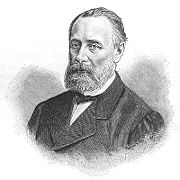
Mikhail Katkov
Encyclopedia

Conservatism
Conservatism is a political and social philosophy that promotes the maintenance of traditional institutions and supports, at the most, minimal and gradual change in society. Some conservatives seek to preserve things as they are, emphasizing stability and continuity, while others oppose modernism...
Russia
Russia
Russia or , officially known as both Russia and the Russian Federation , is a country in northern Eurasia. It is a federal semi-presidential republic, comprising 83 federal subjects...
n journalist influential during the reign of Alexander III
Alexander III of Russia
Alexander Alexandrovich Romanov , historically remembered as Alexander III or Alexander the Peacemaker reigned as Emperor of Russia from until his death on .-Disposition:...
.
Katkov was born of a Russian government official and a Georgian
Georgian people
The Georgians are an ethnic group that have originated in Georgia, where they constitute a majority of the population. Large Georgian communities are also present throughout Russia, European Union, United States, and South America....
noblewoman (Tulayeva
Asikhmovanov
Asikhmovanov or Osikhmovani was a Russo-Georgian noble family, descending from the Georgian petite noble Tulashvili who went to Russia in the suite of King Vakhtang VI of Kartli in 1724. He elevated them to the princely dignity and they later took the name of Osikhmovani...
). On finishing his course at the Moscow University Katkov devoted himself to literature and philosophy, and showed so little individuality that during the reign of Nicholas I
Nicholas I of Russia
Nicholas I , was the Emperor of Russia from 1825 until 1855, known as one of the most reactionary of the Russian monarchs. On the eve of his death, the Russian Empire reached its historical zenith spanning over 20 million square kilometers...
he never once came into disagreeable contact with the authorities. With the Liberal reaction and strong reform movement which characterized the earlier years of Alexander II
Alexander II of Russia
Alexander II , also known as Alexander the Liberator was the Emperor of the Russian Empire from 3 March 1855 until his assassination in 1881...
's reign (1855-1881) he thoroughly sympathized, and for some time he warmly advocated the introduction of liberal institutions of the British type, but when he perceived that the agitation was assuming a Socialistic and Nihilist
Nihilist movement
The Nihilist movement was a Russian movement in the 1860s which rejected all authorities. It is derived from the Latin word "nihil", which means "nothing"...
tinge, and that in some quarters of the Liberal camp indulgence was being shown to Polish national aspirations, he gradually modified his attitude until he came to be regarded by the Liberals
Liberalism
Liberalism is the belief in the importance of liberty and equal rights. Liberals espouse a wide array of views depending on their understanding of these principles, but generally, liberals support ideas such as constitutionalism, liberal democracy, free and fair elections, human rights,...
as a renegade.
At the beginning of 1863 he assumed the management and editorship of the Moscow News, and he retained that position till his death in 1887. In the first year of his editorship, Moscow News had a circulation of 6000. By 1866, the circulation had risen to 12000. During the twenty-four years of editorship he exercised considerable influence on public opinion and even on the Government, by representing with great ability the moderately Conservative spirit of Moscow
Moscow
Moscow is the capital, the most populous city, and the most populous federal subject of Russia. The city is a major political, economic, cultural, scientific, religious, financial, educational, and transportation centre of Russia and the continent...
in opposition to the occasionally ultra-Liberal and always cosmopolitan spirit of St Petersburg. With the Slavophile
Slavophile
Slavophilia was an intellectual movement originating from 19th century that wanted the Russian Empire to be developed upon values and institutions derived from its early history. Slavophiles were especially opposed to the influences of Western Europe in Russia. There were also similar movements in...
s he agreed in advocating the extension of Russian influence in the Balkans
Balkans
The Balkans is a geopolitical and cultural region of southeastern Europe...
, but he carefully kept aloof from them and condemned their archaeological and ecclesiastical sentimentality.
Though generally temperate in his views, he was extremely incisive and often violent in his modes of expressing them, so that he made many enemies and sometimes incurred the displeasure of the press censure and the ministers, against which he was more than once protected by Alexander III
Alexander III of Russia
Alexander Alexandrovich Romanov , historically remembered as Alexander III or Alexander the Peacemaker reigned as Emperor of Russia from until his death on .-Disposition:...
in consideration of his able advocacy of national interests. He is remembered chiefly as an energetic opponent of Polish national aspirations, of extreme Liberalism, of the system of public instruction based on natural science, and of German political influence. In this last capacity he helped to prepare the way for the Franco-Russian Alliance
Franco-Russian Alliance
The Franco-Russian Alliance was a military alliance between the French Third Republic and the Russian Empire that ran from 1892 to 1917. The alliance ended the diplomatic isolation of France and undermined the supremacy of the German Empire in Europe...
. After Katkov's death his place at the helm of the conservative party was taken by Konstantin Pobedonostsev
Konstantin Pobedonostsev
Konstantin Petrovich Pobyedonostsyev was a Russian jurist, statesman, and adviser to three Tsars...
and Aleksey Suvorin
Aleksey Suvorin
Aleksei Sergeevich Suvorin was an immensely rich newspaper and book publisher and journalist whose publishing empire wielded considerable influence during the last decades of the Russian Empire.He set out as a liberal journalist but, as many of his...
.
----

